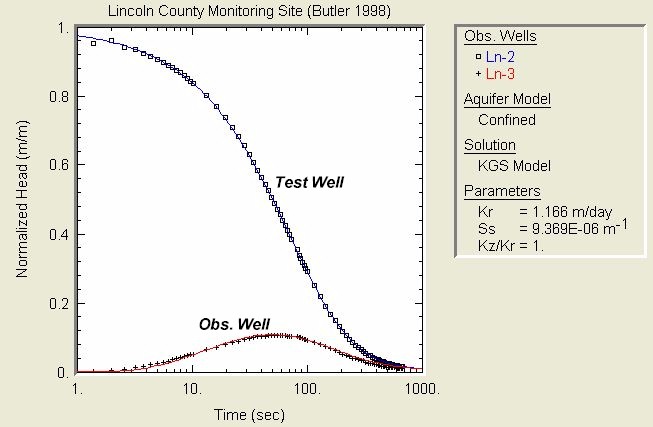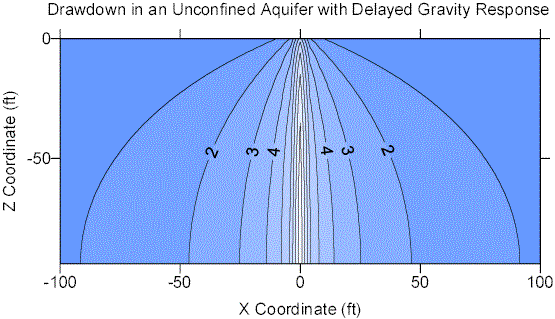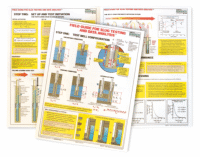
|


|
 Dates and Locations:
Dates and Locations:
Camden Yards Conference Event Center
Baltimore, Maryland, USA
24-26 April 2012 (Tuesday & Wednesday)
Registration from 7:00 - 8:00 am, April 24, 2012
Who should attend:
This course is designed for ground water scientists and engineers, project managers, compliance program managers and remedial design managers.
This course begins with a brief overview of hydrogeologic principles of pumping and slug testing then continues at an advanced level throughout the course to cover the range of conditions typically encountered during field investigations.
Data analysis exercises include both simple and advanced pumping and slug test analyses to match the range of conditions typically encountered during field investigations.
Computer Requirements:
- You are encouraged to bring your own laptop to this course, however, computers will be available for an additional fee. If you need a computer, please let us know with your registration.
- You will be asked to download the AQTESOLV Demo version prior to the course so that you may perform exercises especially designed for this course.
Continuing Education Information:
- 24.0 Professional Development Hours
2.4 Continuing Education Units (CEUs)
- Pre-approved for: Massachusetts LSP (LSP Course No. 1231), Connecticut LEP (LEP Course No. 120), Texas CAPM, Iowa DNR Certified Ground Water Professionals, Oklahoma UST Consultants, & Delaware Board of Geology
Introduction:
Conducting aquifer tests in complex hydrogeologic settings such as heterogeneous or fractured media is a key element to site characterization, water resources assessment and remediation system design. However, poorly planned aquifer testing programs often lead to suspect data or unanswered questions after the field work is complete. Even when you are confident of the geologic conditions, you may have difficulty designing effective aquifer tests, running field equipment or selecting the best available model to analyze the test data. Where can you turn to improve your approach and skills for aquifer testing?
Midwest GeoSciences Group can help! We have designed a powerful three-day training course on aquifer testing design, field methods and data analysis techniques featuring AQTESOLV. This course will provide you with the knowledge to master aquifer testing from beginning to end. Gain an advantage by learning up-to-date methods and procedures for designing, conducting and analyzing aquifer tests.
You are invited to Baltimore, Maryland for an exciting three-day workshop on Advanced Aquifer Testing Techniques Featuring AQTESOLV: New Concepts, Field Methods and Data Analysis Procedures. This unique and practical course, designed for hydrogeologists and engineers of all experience levels, will be taught by three internationally-recognized leaders in the field: Glenn Duffield, author of AQTESOLV for Windows; Jim Butler, author of The Design, Performance and Analysis of Slug Tests; and Shlomo Neuman, principal author of numerous landmark papers on the analysis of pumping tests in multilayer aquifer systems, unconfined aquifers with delayed gravity response and fractured aquifers.
This course covers fundamental methods of aquifer testing as well as innovative new approaches to field and data-analysis procedures. Some of the questions that we will address in this course include the following:
- What are the advantages and disadvantages of pumping tests versus slug tests?
- How do I translate hydrogeologic conditions encountered in the field into a model for a slug test or pumping test?
- How do I account for well loss and determine well efficiency from a step-drawdown test?
- How do I analyze a slug test in a high-K aquifer that exhibits an oscillatory response?
- What methods are available for analyzing pumping tests in fractured bedrock aquifers andhow do I apply them?
- What are the latest guidelines for designing, conducting and analyzing slug tests in wells screened across the water table?
- What is the wellbore storage effect and when is it important to account for it?
- Can I use AQTESOLV to design my pumping test or slug test?
- What are constant-head tests and how do I analyze them?
- What testing and analysis procedures are available for characterizing heterogeneous aquifers?
- What is the best method to account for noninstantaneous (noisy) slug test initiation?
- How do I get the most out of the AQTESOLV software?
This course demonstrates ways in which these questions can be answered by understanding and improving the design of pumping and slug testing, learning meaningful field methods, and practicing appropriate data analysis using AQTESOLV.
You will enjoy personalized instruction from Glenn Duffield, Jim Butler and Shlomo Neuman who have designed a comprehensive course for all types of ground water professionals. This course is unique because it covers new and updated material focusing on constant and variable-rate pumping tests, single and multiple-well tests, tests in fractured rocks, derivative plots, and much more. Participants are encouraged to bring their own datasets and notebook computers for use on example problems.

Classroom and Computer Exercises Dedicated to Slug Testing (Tuesday)
The first day consists of real-world applications for evaluating how slug tests can be designed, performed and analyzed with a series of lectures and hands-on personalized computer exercises. Topics in previous courses have included:
General Design Guidelines for Slug Tests:
- Initiation Methods
- General Principles of Test Design
- Impact and Recognition of Incomplete Development
- Scale issues
Design of Slug Tests in Low-K Media:
- New Approaches for Decreasing Test Duration
Design of Slug Tests in High-K Media:
- Inertia-Induced Responses - Overdamped to Underdamped
- Dependence on Slug Size
- Importance of Transducer Placement
- Data Analysis Strategies for Estimating Hydraulic Conductivity
Slug Tests in Direct Push Equipment
- Small Diameter Well Corrections
Major Methods of Data Analysis for Slug Tests:
- Unconfined Aquifers
- Confined Aquifers
- Fractured Aquifers
- Aquitards
- Fractured Aquitards
- Water Table Wells in Sand
- Water Table Wells in Weathered Till
Incorporation of Well Borehole Conditions:
- General Equipment Overview
- Data Acquisition Forms and Data Analysis Forms
 (Analysis of Multi-Well Slug Test Using KGS Model)
(Analysis of Multi-Well Slug Test Using KGS Model)
Classroom and Computer Exercises Dedicated to Pumping Tests (Wednesday)
The second day consists of real-world applications for evaluating how pumping tests can be designed, performed and analyzed with a series of lectures and hands-on personalized computer exercises. Topics in previous courses have included:
Introduction to Pumping Tests:
- Major Applications & Overview of Procedures
- General Principles of Test Design
- Aquifer Models and Wellbore Models
- Model Building Procedure
- Common Problems and How to Handle Them
Flow to a Line-Source Well in a Confined Aquifer:
- Introduction to Theis Type-Curve Solution
- How to Accomodate Partially Penetrating Wells
- Introduction to Cooper-Jacob Straight-Line Solution
- Radial Flow in an Infinite-Acting Aquifer
Performance of Pumping Tests:
- Equipment Overview
- Importance of Equipment Calibration
- Use of Data Acquisition and Data Analysis Forms
- Field Indications of Successful Pumping Test Performance
Diagnostic Flow Plots
- Overview and Radial Flow Plots and their Many Applications (one of Glenn' s favorite subjects)
Tips and Tricks for Curve Matching with AQTESOLV:
- Visual Curve Matching vs. Automatic Curve Matching
- Parameter Tweaking
- Active Type Curves
Flow to a Finite-Diameter Well in a Confined Aquifer with Well Storage and Skin Effects:
- Papadopulos-Cooper and Dougherty-Babu Solutions
- Graphical Methods for Detecting Wellbore Storage
- Effective Casing Radius
Analysis of Variable Rate Tests:
- Theis Recovery Solution
- Agarwal's Method (technique for analyzing recovery tests)
- Step-Drawdown Testing
Get Personalized Hands-On Teaching From Glenn Duffield and Jim Butler
 Gain an advantage by mastering AQTESOLV
Gain an advantage by mastering AQTESOLV
(Get More From Your Pumping and Slug Testing Than Ever Before)

Classroom Sessions (Thursday)
The third day includes a comprehensive series of lectures and computer exercises focused on pumping tests. Topics in previous courses have included:
Flow to a Well in a Leaky Confined Aquifer:
- Hantush-Jacob Solution without Aquitard Storage
- Hantush Solution without Aquitard Storage
- Neuman-Witherspoon Solution for a Confined Two-Aquifer System
Flow to a Well in an Unconfined Aquifer:
- Neuman Solution with Delayed Gravity Response
- Moench-Prickett Solution with Conversion From Confined to Unconfined Conditions
 Design of Pumping Tests in High-K Aquifers:
Design of Pumping Tests in High-K Aquifers:
- Oscillatory Responses
- Small Drawdown
- Data Acquisition Techniques
Pumping Tests for Characterizing Aquifer Hetrogeneity:
- Dipole Flow Test
- Borehole Flow Meter Test
- Direct-Push Methods
Flow to a Well in Double-Porosity Fractured Rock:
- Uniform Flux vs. Infinite-Conductivity Models Graphical Methods for Detecting Flow to a Fracture
- Understanding and Choosing Double Porosity Models
- How to Identify and Correct Fracture Skin Effects
- Gringarten-Witherspoon & Gringarten-Ramey Solutions
- Uniform Flux vs. Infinite-Conductivity Models
- Moench Solution
Non-Uniform Aquifers and Boundaires:
- Butler solution
- Image Well Theory and its Solutions
Special Subjects Session:
- Methods for Analyzing Stream-Aquifer Systems
- Test Design (Prediction)
- Constant-Head Tests
- Horizontal Wells
- Various pump and treat systems
- Effectiveness of natural attenuation
Registration Information:
Advanced registration is necessary for participation in this limited-enrollment short course. Pre-registration is required to reserve space and receive course materials. A minimum of 25 people must be registered at the early registration deadline to conduct any short course, but please note this course normally reaches maximum capacity a few weeks before the early registration deadline. If you require special arrangements for diet, equipment, or handicap facilities, please indicate when registering for the course.
What you will receive:
You will receive 24.0 contact hours of instruction, a Field Guide for Slug Testing and Data Analysis, a comprehensive 300-page course notebook with many aquifer testing reference resources and a CEU completion certificate. You will receive a special offer on purchasing AQTESOLV. Registration also includes continental breakfast, morning coffee break, lunch, and an afternoon break. Recording devices are not permitted during classroom sessions.
 Register by April 10, 2012 and receive 1 Free Ticket to our Private Luxury Suite at Camden Yards on April 25th for an evening baseball game (while supplies last). Additional tickets may be purchased for $100 when you register. Register by April 10, 2012 and receive 1 Free Ticket to our Private Luxury Suite at Camden Yards on April 25th for an evening baseball game (while supplies last). Additional tickets may be purchased for $100 when you register.
 Free FIELD GUIDE FOR SLUG TESTING AND DATA ANALYSIS with each registration. Free FIELD GUIDE FOR SLUG TESTING AND DATA ANALYSIS with each registration.
And, you may purchase additional field guides for a special discounted price of $18.00 plus shipping.
 Attendees have the option to purchase Jim Butlerís book: Attendees have the option to purchase Jim Butlerís book:
The Design, Performance, and Analysis of Slug Tests for the low price of $95.00 plus shipping.
Cancellations:
Cancellations may be made up to two weeks before the course, however, a 25 percent of the course fee will be charged. No refunds. One substitute is permitted for each registration who is unable to attend. Cancellations made after two weeks before the course will be charged $500.
Cost:
-Professionals - Register Now: $1195.00
-After 10 April 2012: $1395.00
-Optional Computer Rental (2-days): $300.00
Travel:
Course affiliates are not responsible for ticketing or expenses.
- Glenn Duffield,
Hydrogeologist, President of HydroSOLVE, Inc. and author of AQTESOLV.
- James Butler Ph.D., P.G.,
Hydrogeologist at the Kansas Geological Survey, 2007 Darcy Lecturer, and Author of "The Design, Perfomance, and Analysis of Slug Tests", Lewis Publishers.
- With Special Guest Lecturer Shlomo P. Neuman Ph.D.
Regents' Professor of Hydrology and Water Resources at the University of Arizona and author of numerous landmark papers on the analysis of pumping tests in multilayer aquifer systems, unconfined aquifers with delayed gravity response and fractured aquifers.
Dr. Neuman will provide his unique perspective on state-of-the-art methods for the analysis of pumping tests in unconfined and multiaquifer systems. He will discuss his contribution to the estimation of aquitard properties using the Neuman-Witherspoon ratio method and his recent groundbreaking work on the role of 3D saturated-unsaturated flow in the analysis of unconfined aquifers.
Glenn Duffield is a hydrogeologist and the president of HydroSOLVE, Inc., with over 25 years of consulting experience in groundwater flow and transport modeling, software development and aquifer test analysis. He is the author of AQTESOLV, which for over 20 years has been the world's leading software for the analysis of aquifer tests.
Dr. Jim Butler is the 2007 NGWA Darcy Lecturer and author of "The Design, Performance, and Analysis of Slug Tests" (Lewis Pub., 1998). For the last 21 years, he has worked as a research scientist at the Kansas Geological Survey. He holds a B.S. in Geology from the College of William and Mary, and a M.S. and Ph.D. in Applied Hydrogeology from Stanford University. Jim also serves as a consulting hydrogeologist to federal agencies and private industry, and is currently an associate editor of both Ground Water and the Hydrogeology Journal.
Dr. Shlomo P. Neuman is Regents' Professor of Hydrology and Water Resources at the University of Arizona. Among his many accomplishments and countless reference publications, Dr. Neuman has made seminal contributions to the area of pumping test design and analysis including the theory of flow in multiaquifer systems, estimation of aquitard properties and flow in unconfined aquifers.
- These are the guys who literally wrote the book - excellent course, very helpful, and cutting edge.
- Paul Blubaugh, Michael Pisani & Associates, Inc.
- This (is) the best course that I've ever attended and I look forward to future course offerings. Excellent!
- Mark Larson, Larson & Associates
- I enjoyed the course. Excellent insight and feedback with informative discussions.
- Jason Whitman, Shaw Environmental
- Great Course! Would highly recommend it to any hydrogeologist.
- Dan Weber, Errol L. Montgomery & Associates
- All-in-all, one of the best courses I've ever taken.
- Cynthia Gefvert, South Florida Water Management District
- The course was extremely helpful in identifying potential sources of error in our slug testing design and performance techniques. The guided software exercises by Glenn easily walked us through practical applications.
- Jason LaRoche, Southwest Florida Water Management District
- The class clarified how pumping and slug test equations are applied using AQTESOLV. I especially enjoyed learning to match oscillatory data from High-K aquifers and techniques for improving site characterization of my projects.
- Brian Hennings, Natural Resource Technology, Inc.
- The combination of lectures and computer lab make this an excellent course which I would recommend to anyone.
- Chuck Ahrens, Conestoga-Rovers & Associates
- I enjoyed Glenn's ability to effectively translate and teach historical calculations into understandable application through the use of AQTESOLV. The course helped me to move from the "old school" data interpretation into the real-time world of 2006.
- Glenn Beckingham
- Awesome Course!
- Jennifer Thompson; ERM, Inc.
- Excellent course, well organized and full of practical information for anyone who uses analytical techniques to estimate hydraulic parameters. Great Class!
- Jon Benedict, Washoe County Water Resources
- All presentations were helpful and well covered.
- Joe Vickers, Wellspec
- The course was excellent! The instructors were fantastic. Both the slug testing and pumping test analysis portions were valuable. Data analysis (during my on-going aquifer testing projects) will be better now with the information I have obtained from this course.
- Monica Westlake, AMEC Calgary
- I really enjoyed the course!
- Linda Aller, Bennett and Williams
- A very professionally conducted course. The personal care that was also put into the handouts, computer exercises, and even lunch was an asset to this 3-day course.
- Darla Latham, Petroleum Services
- I'd be willing to take this course a third time....
- Mark Larson, Larson & Associates
- I had little experience designing and conducting slug tests and pumping tests .... before this course, so this course was a great experience for me.
- Anonymous
- As a geologist, I have performed dozens - if not hundreds - of slug tests and aquifer pumping tests.. This course has tied together a lot of loose ends for me and I have gained valuable insight and knowledge. The (course session) about the set up of slug tests and aquifer tests and common problems and considerations was extremely helpful for me.
- Britt Callahan
- One-on-one interaction with the instructors to discuss my (specific) project questions was most valuable to me. The course provided me with powerful tools for current and future ground water projects.
- Rocco Fiori, Fiori GeoSciences, Inc.
- Having my questions answered by the guys who develop the software (and wrote the book on slug testing) was most valuable to me. The tour was awesome and meeting the people who handle technical support.
- Thai Hubbard, ARCADIS
- Good introduction to (aquifer testing) with most practical information for running tests. Good information for using software (applied) to a large variety of solutions.
- Ted VanHolland, Rendezvous Engineering, Inc.
- The entire course was extremely helpful. I learned more about aquifer testing in two days than in (many) years of practice. Excellent course. Excellent Instructors, Great Presentations, Engaging Speakers.
- Anthony Harding, Schnabel Engineering
- I got what I wanted and more from the class and instructors. And I am recommending 'MidwestGeo' classes to friends.
- Chris Palmer
 Announcing a Special Venue Location!
Announcing a Special Venue Location!
Camden Yards Conference Event Center
Fourth Floor Event Center overlooking Oriole Park
Downtown Baltimore
Home of the Baltimore Orioles Major League Baseball
http://baltimore.orioles.mlb.com
Join us for a reception after Day Two, April 25 in a special guest Suite for the evening baseball game vs. Toronto Blue Jays at 7pm.
Information about the reception, suite and game is forthcoming.
We are inviting two sponsors to host the reception on a first come basis. Call Dan Kelleher for how you can become a sponsor: 763.607.0092.
 HARBOR COURT BALTIMORE
HARBOR COURT BALTIMORE
550 LIGHT STREET
BALTIMORE, MD, 21202
Front Desk: 410-234-0550
Fax: 410-659-5925
Email: icharborcourt@ichotelsgroup.com
http://www.intercontinental.com/baltimore
http://www.harborcourt.com
Reservation Information:
Group Name: Advanced Aquifer Testing Tech
Group Code: BTE
Group Date: 4/24/2012- 4/27/2012
Rate: $ 199++ ( Courtyard View Room) RATE INCLUDES BREAKFAST
Reservation Hotline: 1-800-824-0076
Cut off Date: Tuesday April 10, 2012
|
|
Become A Member
It's Free, It's Easy and as a
Member you'll enjoy...
- Exclusive Videos
- Special Pricing
- And Much More
|
|
Join
|
Learn More
|
Association of Environmental
& Engineering Geologists
|